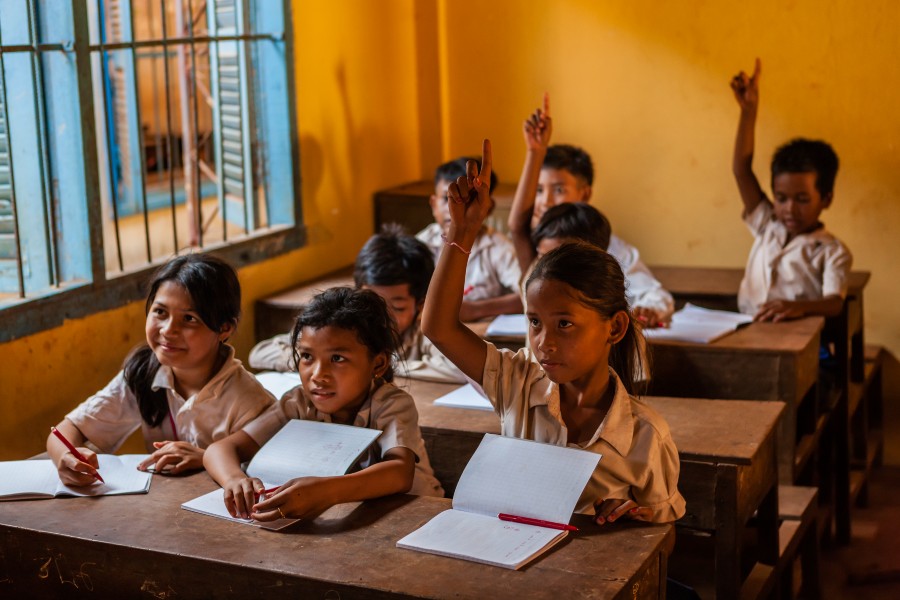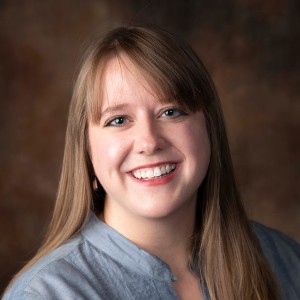Alumna makes global change community by community
Bethany Eldridge (BA ’12) uses research, collaboration, creativity and international worldview to impact access to education around the world.
Janel Shoun-Smith |

When Bethany Eldridge (BA ’12) began studies in her major at Lipscomb, she had a vague notion that she wanted to “learn to help people.” Certainly, she said, her four years in the law, justice and society program helped solidify that “vague” notion into a desire to advance quality education for all.

But even as a graduating senior with a 2012 Fulbright award, she didn’t dream of everything that was in store for her: work with the Alignment Nashville initiative and an education technology start-up in California; a master’s from England’s University of Cambridge in education globalization and international development; travel around the globe to help schools enhance access to education, and now she is working on a doctorate from the University of Michigan, with a dissertation focused on schools in Lebanon, where, in the midst of the country’s severe economic crisis, over one million students are out of school.
While her career has taken her from interviewing teachers in Bangladesh to touring the prison system in Idaho, it really all boils down to “working toward access to quality education,” she said. “The definition of ‘access’ and ‘quality’ is different depending on the community you live in. My work is all about defining those two terms with each distinct community.”
The law, justice and society program was a firm foundation for her career as it taught her to “explore ways of solving problems beyond legal methods,” said Eldridge, who knew the law school route was not for her. She was interested in a nonprofit or non-governmental organization as a future workplace.
“I used that time at Lipscomb to really explore what the current issues were and what were the underlying reasons of those problems so that I could address the cause and not just the effects. I latched onto education because we will always have problems in the future without quality education for all,” she said.
While at Lipscomb, the LJS program helped her nab internships at the Tennessee Governor’s Office and at the State Collaborative on Reforming Education (SCORE). Her LJS senior project focused on best practices for teaching English language learners, which grew out of her interest in how schools adapt to rapid demographic change.
“The LJS program was the perfect fit for me because it helped me to discover how to support educators to continue and expand their great work,” Eldridge said. “In LJS I learned how law, policy and educators can work together to create change. I liked learning the skills to make things actually happen.”
Upon graduation from Lipscomb, Eldridge said, “I was looking forward to really starting what I felt like was my dream—to be able to work with people who are making real changes happen in the world.”
I used that time at Lipscomb to really explore what the current issues were and what were the underlying reasons of those problems so that I could address the cause and not just the effects. —
It didn’t take her long to get to work. Upon graduating from Lipscomb as one of two valedictorians, Eldridge began her post-baccalaureate career by earning an MA in European studies on society, science and technology from the University of Maastricht in The Netherlands through her Fulbright scholarship.
As part of the Fulbright placement, she conducted research on how technology can be effectively used in education to further access and quality, including for underserved girls globally. It was there that she learned about, and became a passionate advocate for, open education resources (OER), which are freely open resources that can be adapted to fit new contexts and to provide the broadest access and the most supportive education for students in their particular societal situation.
“OER allows space for thinking about how society affects technology, but it also involves moving past education technology just for the sake of technology itself to think about what the society, community or school actually needs,” said Eldridge.
For example, traditional digital technology may not be the best access method for students living in communities with unreliable electricity grids or students who live in refugee camps or war zones.
“Maastricht is where I realized that there isn’t just one solution that will fix everything. You have to think about how society, policy and culture will impact whatever you are proposing as solutions,” she said.
With her master’s in hand, Eldridge began working for the Foundation for Learning Equality, an education technology startup in California, and later moved back to Nashville to work at the Ford Next Generation Learning Hub (Ford-NGL), an initiative of Alignment Nashville, a nonprofit organization created to align community organizations and resources to support Nashville's youth through a positive impact on public school, children's health and the community as a whole.
Eldridge helped Ford-NGL take a proven solution gleaned from the Nashville school system and assist teachers across the country to adapt it to their schools and context. “We were helping educators think about what programs would best fit their schools, helping them think about their students' futures,” said Eldridge.
Then in 2017, she realized that she would like to use her skills in an international job, and that to do so she needed to boost her research skills. Interest in international work is not surprising for someone who grew up globe-trotting with a U.S. Army officer as a father.
“International work is a place to really be creative in how you provide education,” she said. “A lot of organizations are working in international education, but many aren’t considering the contextual differences or educators as leaders. I wanted to do international education work differently.”
In LJS I learned how law, policy and educators can work together to create change. I liked learning the skills to make things actually happen. —
She began looking for an academic program to boost her background in research methods and to expand her ability to approach education problems through research. She kept seeing Cambridge’s Master of Philosophy in Education, Globalisation and International Development pop up in her research. She applied, never really believing she would be accepted.
By 2018, however, she was graduating “with distinction” having conducted a research project on “Using Open Education Resources to Provide Access to Production of Resources in Low- and Middle-Income Countries.” She loved studying in a program full of diverse people from all over the world and all “very motivated and dedicated to helping people,” she said.
After that, she worked as a consultant for educational organizations around the world, including K-12 schools in Africa and East Asia, helping “to support teachers as collaborators,” she said.
“My focus is on conducting research to help educators to scale up their successful programs to reach more people,” she said. She supports those who might not have the capacity for researching the next best step. Her research results give them a starting point and strategic direction while also providing them data to show to potential funders and supporters, said Eldridge.
In 2019, she decided to pursue her terminal degree and is now a Ph.D. candidate in educational studies with a concentration in foundations and policy at the University of Michigan (UM). Her dissertation project, “Understanding how Open Educational Resources Can Empower Teachers of Vulnerable Students in Lebanon” recently won a grant from the university’s Center for the Education of Women+ (CEW+) at the Marsal Family School of Education.
“Now I am looking at more emergency situations where you have to be innovative in the way you think about education, where schooling isn’t consistent for the teacher or the students,” said Eldridge. “A lot of OER research has focused on a Western context. I wanted to focus on OER outside of a Western context, in places where in the past they have had to adapt a resource created elsewhere. I am working to help organizations develop more OER locally.”
Through the CEW+ grant, Eldridge was recognized as a Riecker Graduate Student Research Fellow. CEW+ noted that “in addition to her research, Eldridge has supported women’s education and development through extensive hands-on volunteer work and consultation with nonprofit organizations across the globe including Vision Fund and Poornatha.
“Recognized for her ‘collaborative and inspiring spirit’ and ‘commitment to working for education for all,’ Bethany is poised to make an ever greater impact on women and girls,” said a statement from the center.
Now after more than a decade in the field, Eldridge says she is still inspired by how the impact of her immediate work “spreads beyond just me. Being able to support and shine a light on those who are the champions for their communities,” she said. “That is the most meaningful to me.”